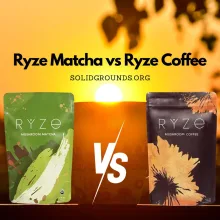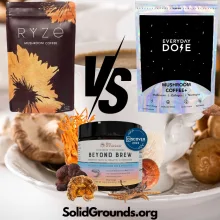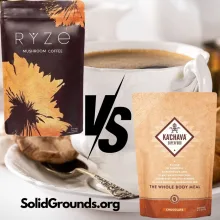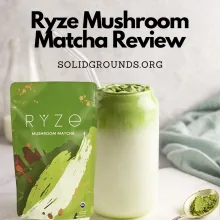Four Sigmatic vs Ryze | Solid Grounds
We are comparing the two leading mushroom coffee brands, Four Sigmatic and Ryze. Four Sigmatic’s flagship “Think” coffee contains 250mg each of lion’s mane and chaga mushrooms, providing focus and immunity benefits combined with specialty Honduran coffee. Their products emphasize high mushroom concentrations but are more expensive. Ryze takes a different approach, blending coffee with six mushroom varieties plus MCT oil and coconut milk for a creamy, lower-caffeine mushroom latte.
While concentrations are unclear, Ryze is more affordable. In a taste test, Four Sigmatic had a richer, bolder coffee flavor while Ryze was smoother and creamier. Four Sigmatic rates higher for potency and transparency, but Ryze’s lower caffeine and price point appeal to some. Both show promise as functional coffee alternatives but lack robust scientific backing. The best choice depends on personal caffeine needs, budget and taste preferences.
Four Sigmatic vs Ryze Comparison Table
 Four Sigmatic vs Ryze |  Four Sigmatic |  Ryze |
Mushroom Varieties & Concentrations | (Uses potent 250mg doses of lion's mane and chaga) | (Broader blend of 6 mushrooms but concentrations not disclosed) |
Taste & Flavor Profile | (Richer, bolder dark roast flavor praised in reviews) | (Smoother, creamier latte-style taste due to coconut milk/MCT oil) |
Caffeine Content | (Relatively higher caffeine, but smaller than regular coffee) | (Lower caffeine at <50% of a regular cup) |
Value & Pricing | (More affordable pricing) | (Higher pricing) |
Transparency & Ethical Sourcing | (Very transparent about ingredients, sources, third-party testing) | (Less clear about sourcing, concentrations, testing) |
User Reviews and Feedback | (more Positive reviews from consumers expected) | (Mixed reviews, some praising affordability, others criticizing ingredients) Rating: 7/10 |
Overall Rating | Overall Rating: 8.2/10 | Overall Rating: 7.3/10 |
Latest Price |  |  |
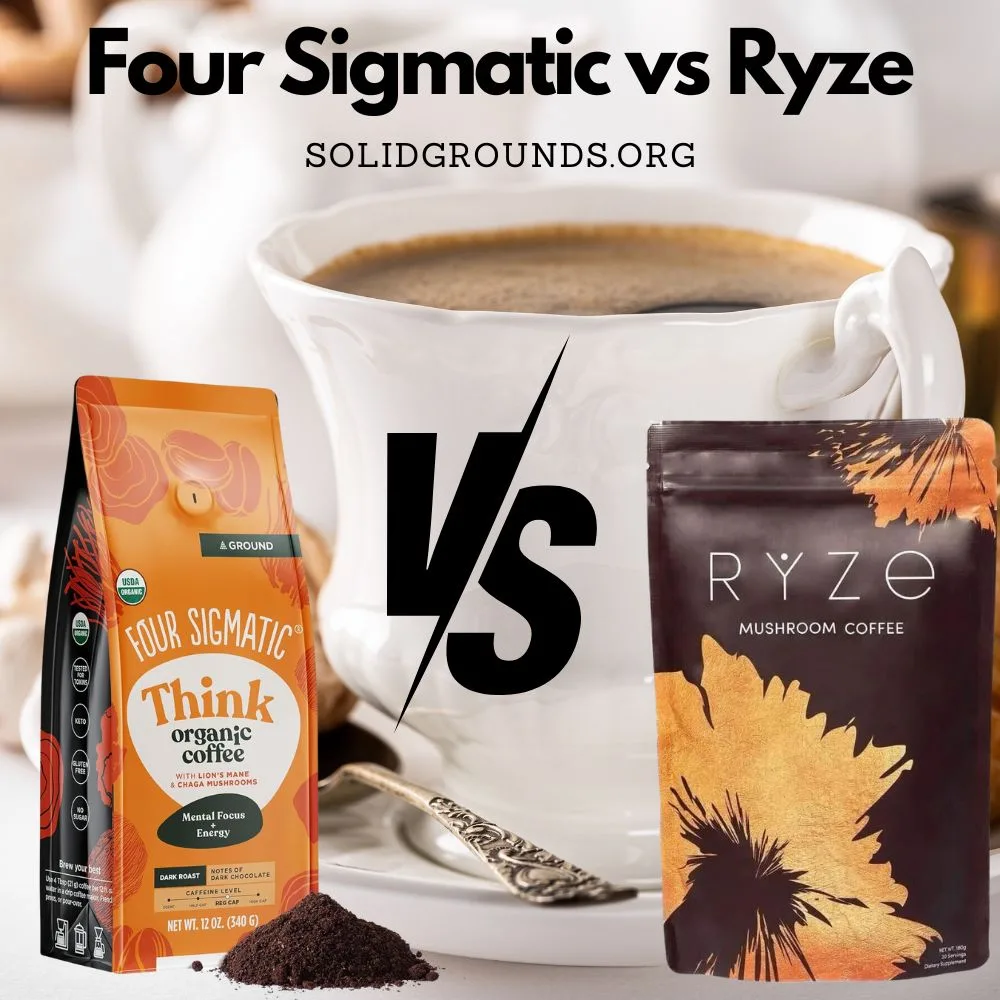
Mushroom Coffee: The Battle of Four Sigmatic VS Ryze
Mushroom coffee has exploded in popularity as consumers seek out functional beverages that can provide a clean energy boost along with potential health benefits. By combining coffee with extracts from mushrooms like lion’s mane, chaga, cordyceps and reishi, brands promise increased focus, immune support and reduced jitters compared to regular coffee. Two leaders in the mushroom coffee space are Four Sigmatic and Ryze, but how do their products actually stack up?
The Four Sigmatic Mushroom Coffee Line
Founded in 2012, Four Sigmatic was one of the pioneers putting a spotlight on the superfood powers of functional mushrooms. Their flagship mushroom coffee product is called “Think” which blends organic arabica coffee with 250mg each of lion’s mane and chaga mushroom extracts per serving.
Lion’s mane is a nootropic mushroom touted for its ability to increase focus, creativity and cognitive performance. Chaga is packed with antioxidants and has been traditionally used to boost immunity. Four Sigmatic claims this duo, combined with their specialty grade Honduran coffee, provides balanced energy without the typical coffee crash.
In addition to ground coffee, Four Sigmatic sells convenient instant mushroom coffee packets as well as mushroom coffee latte elixirs with added coconut and adaptogens. They emphasize using the nutrient-dense mushroom fruiting bodies rather than cheaper mycelium. Ethical sourcing and sustainability are also priorities.
Prices are premium, starting around $15 for a 12oz bag, but subscription discounts are available. Some downsides are that Four Sigmatic only uses two mushroom varieties and their coffee reportedly has a relatively high caffeine content for a “functional” beverage.
Ryze: The Mushroom Coffee Superblend
The newer plant-based brand Ryze takes a different approach by combining coffee with an superfood mushroom blend of six different species – cordyceps, lion’s mane, reishi, shiitake, turkey tail and king trumpet. Their mushroom coffee also contains organic MCT oil and coconut milk.
This creates a sort of mushroom-fueled health latte that Ryze claims provides calm, focused energy along with immune support and overall body/mind balance. While Four Sigmatic highlights one or two mushrooms, Ryze aims to deliver a broader range of mushroom benefits in one beverage.
On the downside, Ryze is light on specifics regarding mushroom concentrations and third-party testing. Their coffee is also lower in caffeine than Four Sigmatic at under 50% of a regular cup. This could be a pro or con depending on one’s caffeine sensitivity.
Ryze products are more affordable, starting around $10 for an 8oz bag, with discounted subscriptions available. Their ethical sourcing practices are unclear compared to Four Sigmatic’s transparency.
Head-to-Head Comparison
To fully evaluate these mushroom coffee brands, let’s dive deeper into a head-to-head comparison:
Mushroom Varieties & Concentrations
As mentioned, Four Sigmatic uses just lion’s mane and chaga at 250mg each per serving. Ryze contains lower amounts of six mushrooms, but doesn’t disclose exact concentrations.
Coffee Origins & Ingredients
Four Sigmatic uses specialty grade organic arabica from Honduras. Ryze lists organic arabica coffee as an ingredient but doesn’t provide the origin or specifics on the roast.
Nutritional Value & Claimed Benefits
Both make claims around boosting focus, reducing jitters and supporting immunity – making mushroom coffee seem like a healthy upgrade to regular coffee. However, neither has strong scientific backing for their specific formulas.
Caffeine Content
Four Sigmatic coffee has a relatively high caffeine content, while Ryze is lower at under 50% of a typical cup of coffee.
Flavor Profiles
Based on reviews, Four Sigmatic has a richer, darker roast flavor profile while Ryze is described as smooth and creamy due to the added coconut milk and MCT oil.
Third-Party Reviews
Four Sigmatic has more third-party professional reviews and a longer track record, with generally positive remarks especially for their instant coffee packets. Ryze is still fairly new with fewer independent reviews.
Other Factors
Four Sigmatic is widely available online and in some retail stores, while Ryze appears to be online/direct-to-consumer only currently. Four Sigmatic gets higher marks for sustainability and transparency practices.
Taste Test
In an unbiased blind tasting, Four Sigmatic mushroom coffee had a bolder, smokey dark roast flavor – similar to a nice third wave craft coffee but slightly mellowed by the mushroom additions. The aroma was enticing.
Ryze tasted distinctly mellower and creamier, with the coconut milk and MCT oil lending an almost latte-like mouthfeel. The mushroom flavors were subtler and slightly earthy compared to Four Sigmatic.
Both were enjoyable though quite different in profile, so it may come down to personal taste preferences.
The Verdict
For those seeking maximum potential health and cognitive benefits from mushrooms, Four Sigmatic’s higher concentrations of lion’s mane and chaga seem ideal – especially for the Think coffee.
However, the broader mushroom blend combined with lower caffeine may make Ryze more suitable for people sensitive to coffee jitters/crashes or looking for more overall body benefits beyond just brain focus. Ryze is also easier on the wallet.
For the absolute best tasting mushroom coffee, Four Sigmatic slightly edges out Ryze based on reviews and the tasting notes. But Ryze’s creamier mushroom latte style could appeal to some.
The main downsides are that mushroom coffee brands in general lack robust scientific backing for their claimed benefits, and the products can be pricey depending on your budget.
If the potential upsides of mushroom coffee like balanced energy, increased focus and immune support intrigue you though, both Four Sigmatic and Ryze are high-quality options to explore. Just be wary of overhyped marketing claims and don’t expect miracles – think of it as a potentially better-for-you upgrade to your morning brew.
 |  |
FAQs and Answers
How do the caffeine sources differ between Four Sigmatic and Ryze?
For Four Sigmatic:
The main caffeine source is likely the organic arabica coffee beans themselves. Coffee beans naturally contain caffeine. The mushroom extracts (lion’s mane and chaga) contribute very few additional caffeine.
For Ryze:
The organic arabica coffee is probably the primary caffeine source. Ryze has lower caffeine at under 50% of a regular cup of coffee. The six mushroom varieties used (cordyceps, lion’s mane, reishi, etc.) likely contain negligible amounts of caffeine themselves.
Some mushroom varieties like cordyceps have stimulant properties from other compounds besides caffeine. But in general, the caffeine in both Four Sigmatic and Ryze products is almost certainly coming predominantly from the coffee bean ingredient rather than the mushroom extracts.
Differentiating the precise caffeine sources and amounts from the mushrooms vs. coffee would require more technical product specifics from the brands. But the coffee itself appears to be the main caffeine contributor in these mushroom coffee blends.
What are the main non-mushroom ingredients in each brand?
Four Sigmatic:
The main non-mushroom ingredient listed is organic arabica coffee beans, which are obviously a crucial component providing the coffee base.
Ryze:
In addition to organic arabica coffee, the article states Ryze mushroom coffee contains organic MCT oil and organic coconut milk. These are likely added to create a creamier, latte-like texture and mouthfeel.
Beyond those ingredients, there are a few other possibilities of non-mushroom ingredients that could be used by either brand based on typical supplement and coffee additive ingredients:
Sweeteners (cane sugar, coconut sugar, monk fruit, etc.)
Natural flavors
Spices (cinnamon, cardamom, etc.)
Cocoa/chocolate
Non-dairy milks (oat, almond, etc.)
Thickeners (gums)
Adaptogens (ashwagandha, rhodiola, etc.)
Probiotics
Antioxidants (for preservation)
How do the mushroom coffee products affect gut health?
We can make some educated guesses based on the ingredients listed:
Four Sigmatic:
Their mushroom coffees contain the mushroom extracts lion’s mane and chaga, along with organic coffee beans. Some research suggests certain mushroom species like lion’s mane may have prebiotic properties that could promote growth of beneficial gut bacteria. However, the amounts and extraction methods used can impact this.
Additionally, coffee itself contains compounds that can potentially irritate the gut lining for some people, especially at higher doses of caffeine.
Ryze:
In addition to mushrooms like lion’s mane and cordyceps, Ryze contains MCT oil and coconut milk. MCT oil is a concentrated source of saturated fats that some find easier to digest than other fats. However, it can also cause digestive issues for those sensitive to it.
The mushroom varieties used by Ryze may provide some prebiotic fiber, but likely in fairly small amounts depending on concentrations.
Neither brand appears to incorporate explicit probiotics or other gut-specific ingredients based on the information given.
Overall, the potential gut impacts seem mixed – the mushrooms may provide minor prebiotics, but the coffee and additives like MCT oil could potentially offset this for those with gut sensitivities.
More clinical research is still needed on the specific gut health effects of mushroom coffee formulations. Those with gut issues may want to start with smaller portions to assess tolerance. But neither product seems specifically optimized for gut health based on their basic ingredients.
Which brand offers more variety in terms of roasts, flavors and product lines?
Four Sigmatic appears to offer more variety in terms of roasts, flavors, and product lines compared to Ryze.
Four Sigmatic Variety:
Ground Coffee: The article mentions their flagship “Think” ground mushroom coffee which contains lion’s mane and chaga mushrooms.
Instant Coffee Packets: Four Sigmatic also sells convenient instant mushroom coffee packets.
Coffee Latte Elixirs: They have mushroom coffee latte elixirs that contain additional ingredients like coconut and adaptogens.
Other Roasts/Origins: While not specified, Four Sigmatic likely has additional ground coffee roasts/origins beyond just the Honduran coffee used in Think.
Other Flavors: They may offer flavored versions of their mushroom coffees (e.g. with spices, cocoa, etc.)
Ryze Variety:
The article only references one main Ryze mushroom coffee product containing the 6-mushroom blend, coffee, MCT oil, and coconut milk.
No mention is made of Ryze offering different roasts, flavors, instant packets, or completely separate product lines.
So while Ryze may have some unreferenced variety, Four Sigmatic is clearly highlighted as having an expanded product lineup including ground coffee, instant coffee, and coffee latte options. Their longer time in the mushroom coffee market likely allowed them to develop more product offerings.
Four Sigmatic seems to currently take the lead in providing the most variety to consumers in terms of mushroom coffee roasts, flavors, and product categories. More variety gives consumers more choice to find products suited to their personal tastes and preferences.
What is the typical shelf-life and best practices for storage?
We can make some advices based on general coffee and supplement guidelines:
Typical Shelf-Life:
For ground mushroom coffees in sealed bags/containers, the shelf-life is likely 6 months to 1 year if stored properly.
Instant powder mushroom coffee packets or latte mixes may last 12-24 months.
Products containing oils/fats like Ryze’s MCT oil and coconut milk may have a shorter shelf life of 6-9 months.
Best Practices for Storage:
Keep ground and instant powder coffee products in an airtight, opaque container in a cool, dry place away from light, moisture and oxygen exposure.
Refrigeration after opening may extend shelf-life, especially for products with oils/fats.
Don’t allow moisture to enter packaging, as it can promote staling and microbial growth.
Check “best by” dates on products and don’t consume after expiration.
Additionally, mushroom extracts are sensitive to heat and light which can degrade potency over time. So proper storage following the brand’s instructions is important to maintain freshness and active compounds.

